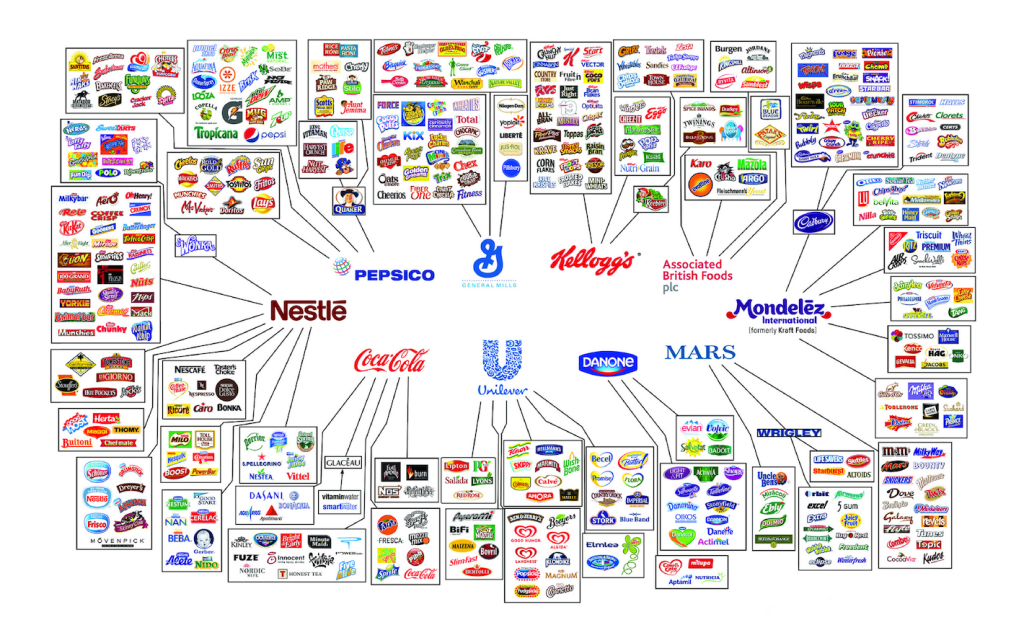If you want to start a hot debate in a room full of people working on food system transformation, bring up the role of multi-national food corporations. The conversation will undoubtedly beeline to a discussion about whether these CPGs can actually meet bold commitments at scale or to a debate over whether the massive publicity around their activity around regenerative represents steps towards transparency or just more greenwashing. But like it or not, these companies – and 10 global food corporations in particular (Nestlé, Pepsico, Coca-Cola, Unilever, General Mills, Kellogg’s, Danone, Mars, Mondelez and Associated British Foods) – control the majority of food supply globally. So any discussion of food system transformation has to account for the role of these entities.
Food Corporations that Control Global Food Supply

Source: Invokbrands, 2018
While these companies have built systems and supply chains that for decades that have proven to be extractive and detrimental to soil health, farmer well-being, rural communities, and human health, the reality is, many are realizing the critical need for change internally and across their supply ecosystem. Drivers include supply chain risk, increasing pressure to meet Scope 3 emissions targets, and to some extent demand from consumers. Research from Tina Owens shows that of the top 100 food companies in the world, 58 are working on regenerative ag – either as small pilots, meeting specific acreage targets (such is the case for General Mills, Pepsi and Cargill) or by tying it to larger business strategies (such as Nestlé). Owens estimates that approximately $1 trillion (in companies total sales) are working toward regeneration and therefore asserts that regenerative agriculture is not a fringe movement, but mainstream.
As they say, “With great power, comes great responsibility,” and such is the case here. Considering the tremendous scale of transformation potential that these corporations represent, they have a key role to play in the systemic transition of agriculture and food away from extraction and degradation.
And while the how is incredibly important, we also wanted to take a look at the who. On their own path to transformation, large food companies have a significant role to play in supporting stakeholders across the system to transition to regenerative.
Here’s a look at four key groups that multi-national food companies can support and how this will facilitate the expansion of regenerative food systems globally:
Farmers
In RFSI’s 7 Lessons from the Past Year, we reported that regenerative agriculture is no longer a fringe topic, that most of the world’s largest food companies have made some kind of commitment toward net zero or regenerative goals, AND that many are realizing that solutions lie in their own supply chains. Because of this, the focus has been on the farmer and the ways that food companies can support their transition to regenerative practices. Three critical points where many have already started to support farmer transitions are:
- Technical Assistance: As farmers take on new practices, technical assistance to reduce the costs of a potentially significant learning curve is important for smooth transition. As food CPGs look back into their supply chain, they have a role to play here. At the corporate level, General Mills is an early adopter and leader in this space. One such example of their work here came earlier this year with the announcement of a new partnership between General Mills, the Rodale Institute and American Farmland Trust aimed at accelerating the adoption of regenerative techniques across California and the Northern Great Plains.
- Finance: The capital required by many farmers to take on new practices – including things like purchasing cover crop seeds, diversifying crop rotations, and taking baseline measurements of soil health – present financial deterrents to adoption. Increasingly, large food companies seeking to incentivize transition within their own supply chains are recognizing that there needs to be financial support to address these costs. McCain Foods has been creative in developing partnerships with financial institutions to help finance the transition of potato farmers in their supply web. One such program, announced in late 2022 with Farm Credit Canada (FCC), uses a combination of funds from FCC’s Sustainability Incentive Program and McCain to issue annual incentive payments to McCain farmers who are working to adopt McCain’s Regenerative Agriculture Framework for the life of the program. Another recent announcement come from Nestlé, which is partnering with Grassroots Carbon to pay ranchers for practices that restore soil health and reduce emissions.
- Market outlets: Many farmers are willing to make the transition to regenerative farming but lack consistent market outlets for their products. By offering consistent markets for these products – in the form of offtake agreements – at fair prices, food companies can help ensure farmers continue these adopted practices.
Technology and Service Providers
There is a large and growing ecosystem of technology and service providers working to create offerings that make the adoption of regenerative practices easier for farmers and the entire system. Partnerships between these service providers and large food companies can be mutually beneficial. With a deep understanding of farming, regenerative systems implementation and more, many of these companies can help large food corporates create smooth project implementation and transition – increasing potential for success. In return, these partnerships can often be the next step in commercial development for these service providers, that are often – due to nascency of the regenerative space – in their first 5-10 years of existence and emerging from start-up phase.
Some notable partnerships include Regrow Agriculture’s work with several food giants – including General Mills and Kellogg’s – as well as input providers like Syngenta to support the scaling of regenerative agriculture within these companies and their supply chains.
Consumers
Media communication about commitments from food CPGs has become much more frequent in the past 18-24 months. One just has to search “corporate commitments to regenerative ag” online and they will find stories from major news outlets like NPR, industry focused outlets like AgFunder News, and a plethora of media announcements from major CPGs, including Danone, General Mills, and Nestle. While there is much debate around whether this is greenwashing or transparency – it’s clear that the masses are getting more and more information about “what” large CPGs are doing. The opportunity that these companies have – and what the regenerative sector needs – is for there to be more robust communication around the “why.” Brand communication, at scale, about the importance of regeneration to consumers – to their health, to the planet, to climate – could go a long way in advancing systemic awareness.
There is recognition of this need and innovation in the consumer awareness space is starting to tip-toe in. McCain Foods, for example, may have one of the most out of the box approaches to raising consumer awareness about regenerative agriculture – it partnered with Bored & Hungry and Roblox to create a free-to-play Farms of the Future game, integrated into one of Roblox’s top ten titles. The game transforms players into virtual potato farmers using regenerative farming methods that improve and restore soil health – players get rewarded when they apply regenerative practices.
Internal Leadership
As regenerative agriculture continues to take hold across the food system, and pressure (and incentives) to adopt sustainable and regenerative practices mount from external forces, leadership within large food CPGs also need support. Those team members working on these efforts within the large food corporations, can play a critical role in evolving internal thinking and approaches to regenerative agriculture across leadership and divisions. This is not an easy task. Often, the internal processes, incentives, measurements of success, and overall systems within these organizations were not built from regenerative mindsets or for regenerative approaches. Perhaps one of the biggest tasks at hand is continuing to be an internal voice for the opportunity of regenerative food systems for corporations and to push for innovation in how to build, execute, measure, and define success in regenerative at the global supply chain scale.
Sarah Day Levesque is Managing Director at RFSI & Editor of RFSI News. She can be reached here.
